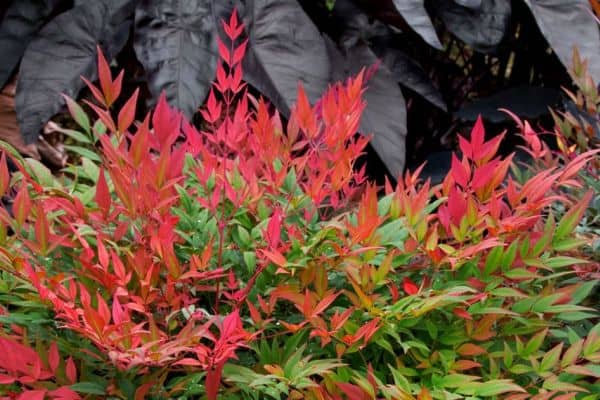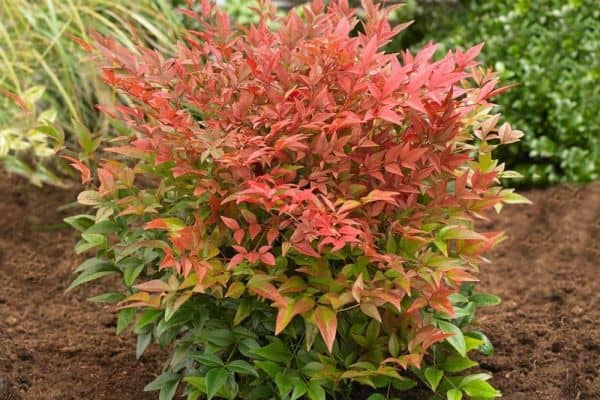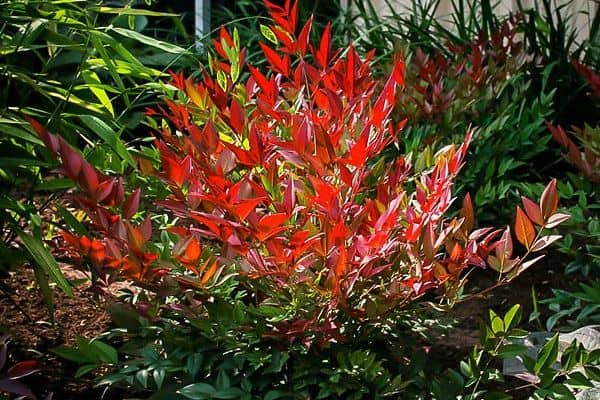Obsession Nandina is a hard evergreen shrub that can elevate your garden landscape a lot. Just remember that they are toxic to pets, horses, and people. They are also famous for being deer-resistant and disease-resistant.
So in this section, we will learn how to care for and grow the Obsession Nandina plant in your house with a complete guide:
Obsession Nandina Care and Growth: Complete Guide
1. Light
As for light Obsession Nandina can survive well in both full sun and full shade as they don’t have much of the light requirement to grow well.
2. Soil
As for soil Obsession Nandina needs medium moisture with well-drained soil for them to thrive well. They need the soil pH within the range of 6.2 to 7.5 and can tolerate both acidic and semi-alkaline soils.

3. Water
As for water Obsession Nandina needs deep watering during the first growing season to help them establish an to help them on extensive root system. Remember to keep that soil moist but don’t waterlog them and if you are planting Obsession Nandina plants in the container you need to water often when it is warm and the air is dry.
4. Temperature and Humidity
As for temperature and humidity Obsession Nandina needs as low as 0 degrees Fahrenheit to as high as 80 degrees Fahrenheit and remember if the temperature goes below or higher that plant will not survive. So to save your plants you can grow them in a warm but mild, humid region with wind protection. You should also add some mulch around the base of your Obsession Nandina plant and if grown in the ground protect the roots of the plants with some covering from freezing temperatures.

5. Fertilizing
As for pruning Obsession Nandina needs slow-release fertilizer to help them grow properly. You can feed a fertilizer to plant once a year during the early spring and remember to use fertilizer amount as the fertilizer description.
6. Pruning
As for pruning Obsession Nandina needs careful trimming. You can prune your plant during the annual spring of one or more trunks at the base of the plant. Remember to keep the lacy foliage alongside the trunks of the plant to give them time to thrive and remain a beautiful accent in your garden.

More About Obsession Nandina
- Bloom/Feature: Bright red new growth
- Evergreen or Deciduous: Evergreen
- Plant Hardiness: Hardy to -10 degrees Fahrenheit to 0 degrees Fahrenheit
- Key Features: Deer Resistant, Disease / Pest Resistance, Water-wise, Winter / Fall Foliage Color
- Flowering Season: None
- Uses: Accent, Container, Mass Planting, Slope
- Water Needs: Medium
- Fertilize: Yearly in early spring
- Pruning: None Needed
- Planting Instructions: Water before planting / Plant in a location that receives the proper exposure for your variety / Dig a hole 2X the width of the pot / Plant 1-2 inches above ground soil level, and backfill the hole with soil / Water deeply to settle, then add more soil if needed / Mulch 1-2 inches deep around the plant, avoiding area closest to stem
FAQs
Q. How big does Obsession Nandina get?
Obsession Nandina when mature can get up to 3 feet tall, with a spread of 3 feet.
Q. What is the problem with Nandina?
Nandina is one of the poisonous plants that is not only to songbirds, but also to pets, horses, livestock, and people.
Q. How much sun does Obsession Nandina need?
Obsession Nandina shrub can do well in both full sun and full shade.
Also Read: How to Grow and Care for Goldfish Plant! Know Its Types, Propagation Tips, and Diseases!
